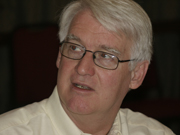Colombian film & broadcasting technicians to restore representation

For three days in late February (23-25) groups of film and television technicians, directors, writers and independent producers met in Bogota to consider ways that they can better lobby for their sector with the local and national government and even seek some on going association with one another to achieve greater dialogue with employers. The meetings were sponsored by UNI-MEI/ PANARTES and LO/TCO in cooperation with CICA, the local actors' union.
The context is quite challenging, to say the least. Colombia for successive years has had either the highest or near the highest levels of repression of trade unions in the world, including common assassination of union leaders. CICA has effectively represented actors and another organisation represents musicians - but neither is a trade union in the traditional sense. The main trade union in broadcasting, the former UNI-MEI affiliate ACOTV, was crushed several years ago in a single day when the public service broadcaster was closed down and tranformed into transmitting service for programming produced outside. In private broadcasting, the main sector in Colombia, workers, except for a core group of adminstrative and management people, are almost all freelance or "independent". Past journalist unions have also been destroyed - through violence in several cases. A sizeable group of journalists have set up a professional association, affiliated with the International Federation of Journalists, as a realistic alternative for the moment. Professional associations also exist for some technical categories. The Colombian Association for Locutores has for some time been active in PANARTES programmes.
Under these circumstances no one proposes that it is realistic to form a traditional union either of film or freelance television workers. Many participants in the meetings, including former members of ACOTV, noted that it was unjust yet a reality that simply to declare oneself as supporting a union in the sector "is interpreted as callling for support for the guerillas in the mountains." It was concluded that the most effective thing that could be done for creators and technicians was not to form still more groups but to carry out more activities that were clearly oriented towards improving the status and situation of the workers through lobbying the government and improving dialogue through professional groups with the employers. It was noted that the somewhat ambiguous position of independent producers (who at once hire technicians but are themselves essentially employees of broadcasters and larger film producers) could actually be helpful in the case of Colombia to encourage dialogue without being polarising or politicising.
Horatio Arrecegor, president of the Argentine media union SATSAID and of PANARTES, Gerardo Gonzalez, international secretary of SATSAID, and UNI-MEI and UNI staff participated in the meetings. It is hoped that UNI-MEI and, in particular, CICA will be able to serve to some extent as an umbrella for the process to continue. Maria Eugenia Panagos, a prominent Colombian actress and president of CICA, did most of the work in preparation of the project; a number of her organisation's members are also directors, writers or technicians. Several government representatives addressed the groups and endorsed their conclusions.

